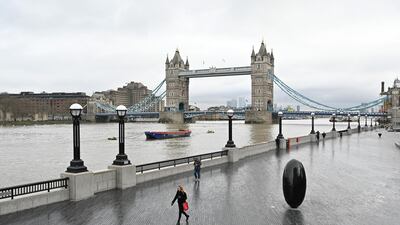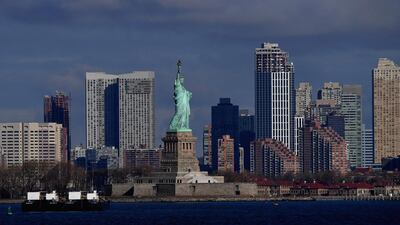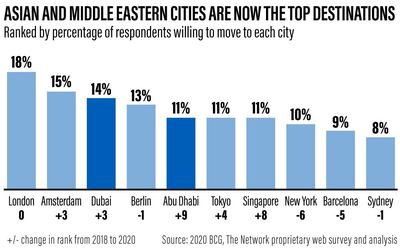Canada overtook the US as the most popular country for foreign workers to relocate in 2021, while Dubai and Abu Dhabi ranked in the top five most desirable cities to move to for work, according to a global survey.
Dubai climbed to third place from sixth in 2018, following London and Amsterdam, while Abu Dhabi rose to fifth place behind Berlin, according to the survey by Boston Consulting Group (BCG) and The Network released on Thursday.
"The United Arab Emirates' effort to turn its premier cities into desirable work destinations seems to be succeeding," said the authors of the report titled Decoding Global Talent, Onsite and Virtual.
The findings are based on a survey of almost 209,000 people in 190 countries to find out if, and under what circumstances, people would move to a foreign country for work. The survey is the third on global workforce trends produced by consultant management firm BCG and recruitment alliance The Network following studies in 2014 and 2018.
The most striking shift in the latest survey was the fall of the US from the top spot, the authors said.
"Hurt by an inconsistent pandemic response, the adoption of more nationalistic policies and social unrest, the US has fallen to second in the rankings, behind Canada and basically in a tie with Australia," they said.
Canada and Australia have both done a "far better job" of pandemic management and are also seen as having better social systems and more open cultures than the US, the authors said.
Although Canada is the world’s current premier work destination, no Canadian cities are in the top 10. Canada’s highest-ranked city is Toronto, which ranked 14th in the survey.
Singapore and New Zealand rose into the top 10 ranking this year, underscoring how Asia-Pacific countries have also done a better job of containing the pandemic, the report said.
"New Zealand has been a model of effective coronavirus management almost since the pandemic began and has other appealing characteristics," the authors said.
In terms of cities, London is the most frequently mentioned city as a work destination in the world.
"The fame and reach of the British Commonwealth give London an aura that helps it overcome geopolitical uncertainties, such as those surrounding Brexit that have dogged the UK as a whole in recent years," the authors said.
Amsterdam and Berlin in the top five have dynamic start-up scenes and are seen as hubs of innovation, the report said.
New York and western cities fall
Some previously popular western cities have fallen in the rankings. New York dropped to 8th place, because it was initially an epicenter of the pandemic in the US as a result of the city’s attractions and cultural institutions still being largely shut down.
The survey also showed how the pandemic has shaped attitudes about work and mobility.
The number of people willing to move abroad for work has declined since the survey began in 2014 by 13 percentage points to 50.4 per cent in 2020, from 63.8 per cent in 2014.
The pandemic, restrictive immigration policies and social unrest have all weakened workers' mobility, according to the report.
However, a new model of virtual mobility is emerging and has an understandable appeal at a time when the usual ways of working have been called into question.
Fifty-seven per cent of respondents say they are willing to work remotely for an employer that doesn’t have a physical presence in their home country, a level that is well above the proportion who are open to physical relocation, the report showed.
The willingness to work for a foreign employer remotely is highest in regions with less-developed economies, such as sub-Saharan Africa, Latin America, and the Caribbean.
Still, some European respondents also find the idea appealing, as do about half of those in the US, the report said.
This work model is less appealing in China, which has abundant local employment opportunities.
"It’s also less appealing in the Middle East, where people’s interest in overseas work may be more bound up in a desire to experience a social and cultural setting that’s different from their own," the authors said.
Top countries to move to in 2021
1. Canada
2. US
3. Australia
4. Germany
5. UK
6. Japan
7. Switzerland
8. Singapore
9. France
10. New Zealand












